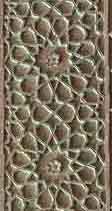FURTHER RESOURCES:
ONLINE BOOKS:
Marshall Hodgson, The Venture of
Islam: Conscience and History in a World Civilization. Chicago: University
of Chicago Press, 1974. Online through the ACLS History E-Book Project:
[ vol.
1 ], "The Classical Age of Islam"; [ vol.
2 ], "The Expansion of Islam in the Middle Periods"; [ vol.
3 ], "The Gunpowder Empires and Modern Times."
*Annemarie Schimmel. Islam: An Introduction.
Albany:
SUNY Press, 1992: online
through NetLibrary. Within their system, here is the exact
location.
*Abdullah Yusuf Ali. The Holy Quran.
Online on the Univ.
of Missouri website. (However, the notes and appendices which are so
valuable in the work of this South Asian translator are not online; for
those, see the widely available print version: Beirut: Dar ul-Qur'an Publishers,
n.d.)
ONLINE ARTICLES:
*George Rafael, "A is for Arabs," a
lighthearted overview (by a CC alumnus) of Muslim contributions to our
lives:
on the CU website.
*Toby Lester, "What is the Koran?"
The
Atlantic, January 1999: on
the Atlantic website; on
the CU website.
*A modern Pakistani version of the
history of Raja Dahar and Muhammad bin Qasim: on
the CU website.
WEBSITES:
*Prof. Jerome W. Clinton's neat website
on Islam:
at
Princeton.
*The best timeline machine for Islamic
history: at
Princeton.
*A glossary containing many Indo-Muslim
terms
on
the CU website.
*A site at Fordham with links to many
Islamic religious and philosophical texts: the
Internet Sourcebook.



